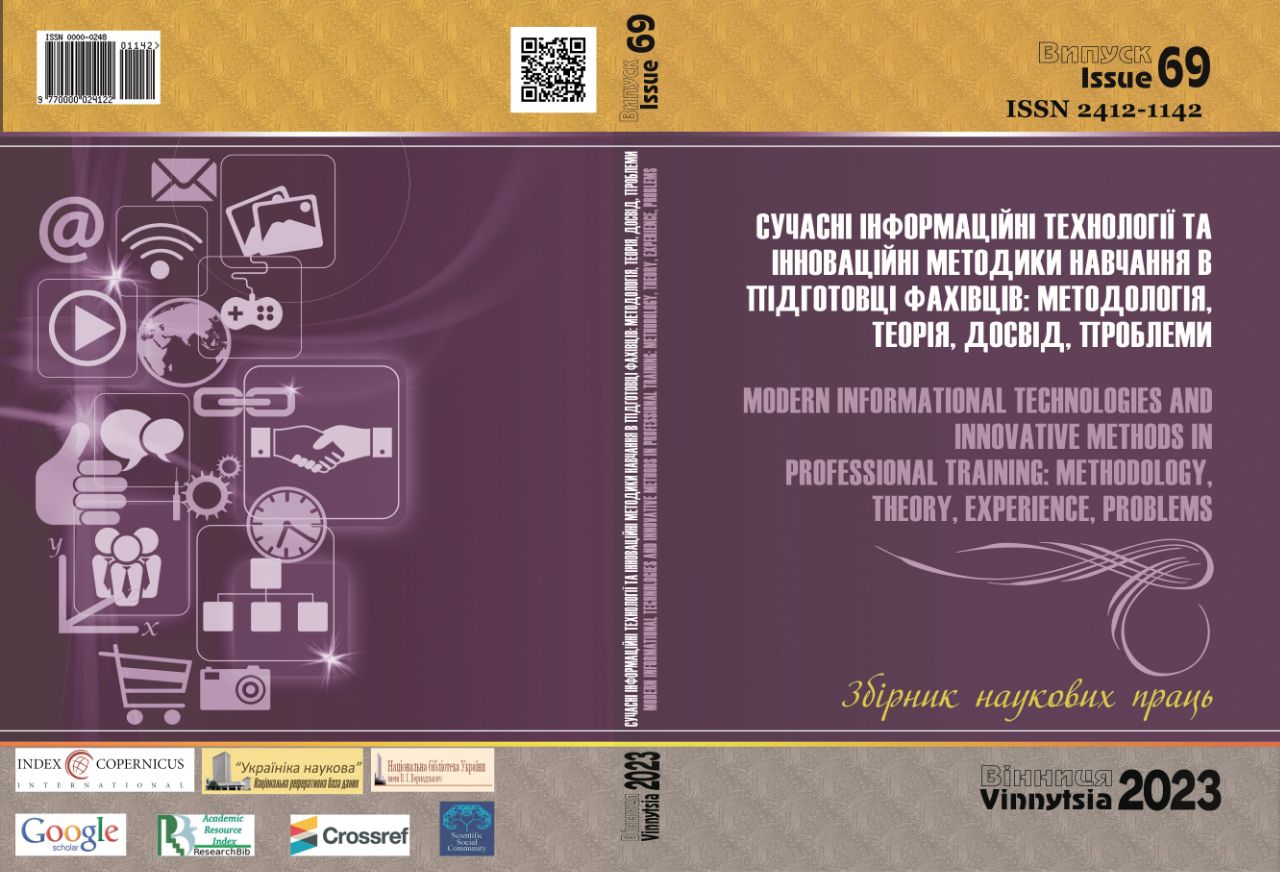E-LEARNING AS AN INNOVATIVE TECHNOLOGY FOR TRAINING FUTURE TECHNOLOGY TEACHERS
DOI:
https://doi.org/10.31652/2412-1142-2023-69-62-70Keywords:
e-learning, innovation, technology, training, education system, forms of education, technology teachersAbstract
Distance learning is one of the forms of the continuing education system, which is designed to realize human rights to education and information. It should become a new educational model that allows for continuous self-improvement aimed at developing the technologies of continuous receipt, processing of information and its practical application. Information education is a requirement of the twenty-first century. A number of factors make the creation of a distance learning system particularly relevant today: the development of a market economy, academic mobility, increasing migration, concentration of large research and education centers in large cities, the formation of new requirements for education, etc. Therefore, distance (e-learning) is an extremely popular form of education due to its convenience and flexibility. The article studies the features of e-learning as an innovative technology for training future technology teachers. In order to achieve the set goals, the authors used theoretical (analysis, generalization, synthesis) and empirical (observation, description, comparison) research methods. The content of the concept of "elearning" is clarified, the stages of its development in the national education system are established; the features and principles of implementation are determined. The conditions for the effective implementation of e-learning in the training of future technology teachers are characterized. It is stated that e-learning in higher education institutions provides a wide range of new services that will help students to acquire new competencies for future professional activities, and teachers to improve their qualifications.
Downloads
References
Биков В. Ю. (2009). Моделі організаційних систем відкритої освіти: монографія.. Київ : Атіка, 684 с
Гуревич, Р., Кобися, В., Коношевський, Л., Коношевський, О., Опушко, Н., & Драчук, М. (2023).
Електронна (дистанційна) освіта і заочне навчання: точки дотику, проблеми, перспективи. Modern
Information Technologies and Innovation Methodologies of Education in Professional Training Methodology
Theory Experience Problems, 14–30. https://doi.org/10.31652/2412-1142-2022-66-14-30
Гуревич Р.С., Кобися В.М., Кобися А. П., Кізім С.С. Куцак Л.В. Опушко Н.Р. (2022). Формування
цифрової компетентності майбутніх учителів у вивченні комп’ютерно орієнтованих технологій навчання.
Сучасні інформаційні технології та інноваційні методики навчання в підготовці фахівців: методологія,
теорія, досвід, проблеми. Збірник наукових праць. Вінниця: ТОВ «Друк плюс». Вип. 63. 220с. (С.5-18).
Кухаренко В. М. (2012). Про систему дистанційного навчання у відкритому дистанційному курсі.
Інформаційні технології в освіті. Вип. 11. С. 32-42.
Кіяновська Н.М. Поняття електронного навчання в контексті сучасної педагогічної науки. URL:
http://www.rusnauka.com/29_DWS_2012/Pedagogica/1_120037.doc.htm (дата звернення: 10.06.2023).
Підготовка майбутніх учителів в освітньо-інформаційному середовищі закладів вищої освіти засобами
інформаційно-комунікаційних технологій: монографія. / за ред.. академіка НАПН України Р.С.
Гуревича. Вінниця: ТОВ Фірма «Планер», 2019. 562 с.
Пінчук О.П., Лупаренко Л.А. (2022). Дидактичний потенціал використання цифрового контенту з
доповненою реальністю. Сучасні інформаційні технології та інноваційні методики навчання в підготовці
фахівців: методологія, теорія, досвід, проблеми. Зб. наук. праць. Вип. 63. Вінниця. 250 с. (с.38-45).
Татарчук Г. (2000). Інституціоналізація дистанційного навчання: соціологічний аспект. Освіта. №1.
с.63-72.
Інтерактивні технології навчання у вищому педагогічному навчальному закладі: навчальний посібник /
за ред. Р.С.Гуревич, М.Ю.Кадемія, Л.С. Шевченко. Вінниця: ТОВ фірма «Планер» 2013. 256 с.
Семеріков С. О. (2009). Теоретико-методичні основи фундаменталізації навчання інформатичних
дисциплін у вищих навчальних закладах : дис. ... д-ра пед. наук : 13.00.02 – теорія та методика навчання
(інформатика). Київ. 536 с.
Bates T. (2001). National strategies for e-learning in post-secondary education and training. UNESCO. 132 p.
Defining eLearning / Performance, Learning, Leadership, & Knowledge Site. Electronic resource. . Mode of
access : http://www.nwlink.com/~donclark/ hrd/elearning/define.html.
Trenholm S., Angel A. Juan, Jorge Simosa, Amilcar Oliveira, Teresa Oliveira Long-Term (2012). Experiences in
Mathematics E-Learning in Europe and the USA. Teaching Mathematics Online: Emergent Technologies and
Methodologies. USA: Information Science Reference, P.238-257.
Rosenberg M. (2007). Beyond E-Learning: New Approaches to Managing and Delivering Organizational
Knowledge. ASTD International Conference. June 3. Atlanta.
Downloads
Published
Issue
Section
License
Copyright (c) 2023 Опушко Надія Романівна, Ланова Лариса Миколаївна

This work is licensed under a Creative Commons Attribution 4.0 International License.





